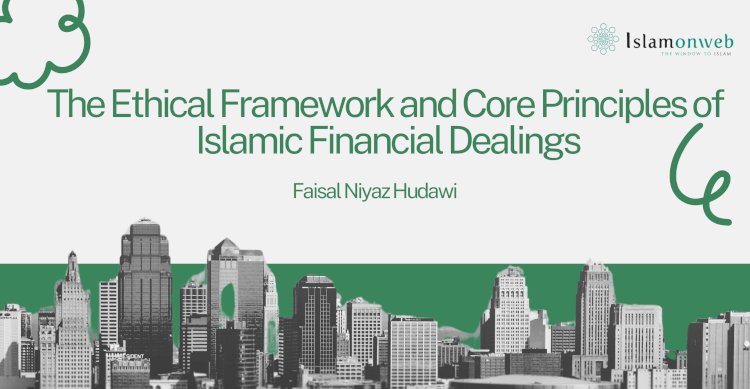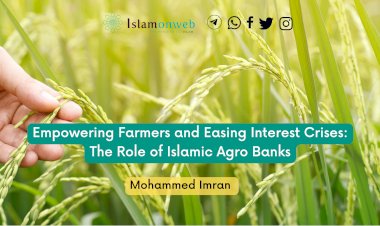The Ethical Framework and Core Principles of Islamic Financial Dealings
Islam accords immense religious significance to financial dealings between individuals. The Qur'an and the Prophetic traditions are replete with stern warnings against those who usurp or misuse the wealth of others and those who deny others their rightful dues. Allah says:
“Indeed, those who devour the wealth of orphans unjustly are only consuming fire into their bellies. They will be burned in a blazing fire.”
(Surah An-Nisā’, 4:10)
Islam presents financial integrity as a primary indicator of piety (taqwā). The Prophet Muhammad ﷺ stated that even the most righteous person will be prevented from entering Paradise if they die with unsettled debts—until those obligations are fulfilled on their behalf[1].
Islam insists that financial transactions must be transparent, accurate, and, where necessary, properly documented. The importance of documentation and witnesses in deferred financial dealings is emphasised in the longest verse of the Qur’an—Surah al-Baqarah (2:282). This verse outlines the etiquettes and precautions to be observed in contractual obligations and credit-based transactions.
In Islamic jurisprudence (fiqh), one of the four major domains is the regulation of financial dealings and contracts. At its core, transactions and agreements between people are presumed to be permissible unless explicitly prohibited. This principle holds as long as the transaction does not involve any forbidden element, violate essential contractual conditions, or lead to injustice.
The majority of scholars uphold the position that all financial dealings that are free from prohibited elements and coercion are deemed permissible. Citing the verse:
“Allah has permitted trade and prohibited usury (interest).”
(Surah al-Baqarah, 2:275)
Imam al-Shāfiʿī affirms that all transactions conducted with mutual consent and not specifically forbidden by the Sharīʿah are lawful[2]. Foundational works in Islamic legal theory (uṣūl al-fiqh) further confirm that the default ruling in commercial transactions and human dealings is permissibility (al-aṣl fī al-muʿāmalāt al-ibāḥa)—provided no harm, injustice, or explicit prohibition is involved[3].
In the following sections, we shall explore some of the basic conditions and core principles that Islam has laid down for valid and ethical financial transactions.
Mutual Consent and Transparency Between Contracting Parties
In any financial transaction, the mutual satisfaction and consent of both parties is a fundamental requirement in Islamic commercial ethics.
Allah says in the Qur’an:
“O you who believe! Do not consume one another’s wealth unjustly, except through trade conducted by mutual consent. And do not kill yourselves. Indeed, Allah is Merciful to you. And whoever does so in transgression and injustice – We shall cast him into the Fire. That is easy for Allah.” (Surah al-Nisā’, 4:29–30)
This verse strongly emphasises the importance of mutual agreement in all financial dealings. It warns against acquiring another person’s wealth through unlawful or coercive means[4], even if apparent consent exists. True consent must be free from exploitation or manipulation.
To ensure this level of satisfaction and clarity, Islamic jurisprudence mandates the formal process of offer (ījāb) and acceptance (qabūl) in transactional agreements. Without this formal mutual commitment, a transaction is not legally or ethically valid in Islam.
Moreover, Islam strictly prohibits the forced sale or acquisition of a person’s property without lawful authority. Every transaction must be executed in a manner that avoids harm or injustice to any party involved.
The famous hadith:
“There should be neither harm nor reciprocating harm”
(Lā ḍarar wa lā ḍirār)[5]
…forms the foundational principle of many Islamic financial rulings. It signifies that one must not harm others nor permit oneself to be harmed by them. The overarching purpose is to uphold fairness, equity, and transparency in all commercial dealings.
In line with these values, Islamic law imposes strict regulations against deceptive practices such as:
- Fraud and misrepresentation
- Concealing defects in goods
- Dual transactions in a single sale
- Ambiguities in pricing or product details
- Government intervention in pricing when it causes unjust outcomes
All of these are restricted to ensure transparency and fairness. For instance, concealing product deficiencies or engaging in speculative pricing practices is considered a serious violation.
The Prophet Muhammad ﷺ also prohibited pre-market agreements with traders—such as meeting caravan merchants before they reach the market and finalising purchases in advance[6]. This is because traders unfamiliar with local prices are more vulnerable to exploitation.
In general, Islam discourages government intervention in market pricing[7], as it can lead to injustice—either toward the seller or the consumer. However, classical scholars have agreed that if prices skyrocket without justification, causing widespread hardship to the public, then state intervention becomes permissible and even necessary for public welfare[8].
Unnecessary Risk and Gambling (Gharar and Maysir)
Islam strictly prohibits transactions involving uncertainty (gharar) that create difficulties for the parties involved, either concerning the price or the object of sale. Linguistically, gharar implies danger or risk[9]. Technically, it refers to situations where the outcome is unknown or undetermined[10]. According to the Shāfiʿī school, gharar is identified when there are two possible outcomes and the more likely one is harmful[11]. The Ḥanafī school interprets gharar as that which is unknown, and some Mālikī scholars explain it as involving two possible outcomes where only one is intended while the other is not[12].
Various related issues such as ambiguity (jahālah), deception (ghabn), and concealment of defects (tadlīs) fall under the broader scope of gharar.
Abu Hurayrah (may Allah be pleased with him) reports:
“The Prophet (ﷺ) forbade transactions conducted by throwing stones and the sale involving uncertainty (gharar).”[13]
Imām Nawawī explains[14] that this hadith establishes one of the foundational principles in Islamic commercial law. Numerous legal rulings fall under its purview, including sales of non-existent goods, unknown items, goods that cannot be delivered, or goods over which the seller has no ownership. All of these are invalid due to the presence of gharar.
A common practice in pre-Islamic Arabia involved throwing a stone at a pile of clothes, and purchasing whichever item the stone landed on. This is the kind of transaction referred to in the aforementioned hadith.
In today’s context, various forms of risky transactions can be found in share markets, stock exchanges, forex trading, and certain types of insurance. These dealings are often riddled with high-risk uncertainties that may lead to disputes and loss for one of the involved parties.
Islam prohibits all forms of unnecessary, avoidable, and excessive risks that are directly connected to the subject matter or price of the transaction[15]. A transaction becomes impermissible due to gharar if it meets all of the following conditions:
- The gharar is significant (not trivial),
- The gharar relates to the primary object of the contract, not peripheral elements,
- The gharar is avoidable and not essential.
Minor or negligible risks that are naturally part of commercial dealings do not invalidate a transaction[16]. Scholars are in consensus on this point. There is also agreement that excessive gharar renders a transaction void, while minimal gharar is tolerated. The difference of opinion lies in how to assess intermediate levels of risk[17]. Imām Nawawī notes that gharar which is difficult to avoid or necessary for commercial practicality is excused in Islamic law.
Transactions involving the sale of specified goods not in one’s ownership or possession, sales where the price is not clearly fixed, or installment sales without clearly stated payment timelines, or where the seller changes the price after the sale is completed—all fall under the scope of gharar.
Many forms of futures and options trading in stock and commodity markets, network marketing, and money chain schemes are heavily characterised by gharar and fall into impermissible categories under Islamic law.
Gambling (Qimār / Maysir)
Another major prohibition in Islam is gambling[18]—known in Islamic jurisprudence as qimār or maysir. These terms refer to transactions where one party gains at the expense of another, resulting in unjust enrichment. One party experiences financial loss while another enjoys gain.
A clear example is that of lotteries, where many participants lose all their money while a few individuals win large sums. Similar elements of speculation and risk are found in futures and options trading within stock markets. These transactions can result in huge profits for one party and massive losses for the other, embodying the essence of gambling.
Conventional insurance contracts also often display characteristics of gambling. They involve uncertainty about payout, the occurrence of the insured event, and typically a disparity between the premium paid and the benefit received, all of which contribute to the maysir-like nature of such agreements.
Interest-Based Transactions (Ribā)
Islam strictly prohibits all forms of interest-based transactions (ribā). The Qur'an describes those who do not desist from engaging in interest as declaring war against Allah and His Messenger[19]. Numerous Qur’anic verses and prophetic traditions explicitly prohibit ribā. The Prophet Muhammad ﷺ categorised ribā as one of the seven major destructive sins.
Throughout history, there have always been individuals who claimed that interest and trade are the same. To those who question, “How can receiving interest be sinful while engaging in trade is permissible?”, the Qur'an responds:
“Allah has permitted trade and forbidden interest.” (Surah al-Baqarah, 2:275)
Elsewhere, it states:
“O you who believe! Do not consume interest, doubled and multiplied.” (Surah Āl ʿImrān, 3:130)
Since the Islamic ruling on ribā is clear and well established, it requires no further elaboration. However, some argue that modern bank interest is not included in the ribā prohibited by Islam. This misconception arises from a lack of understanding of the various categories of interest mentioned in the Qur'an and Hadith.
There are two major types of ribā in Islamic law:
- Ribā al-Qur’ān (Usury-based Lending)
The literal meaning of ribā is “increase.” The Qur'anic reference is primarily to the pre-Islamic form of usurious lending, known as Ribā al-Jāhiliyyah, also referred to as Ribā al-Qur’ān. This occurs when the borrower is required to pay an increased amount in return for extending the loan period. It involves increasing the debt liability due to a deferred repayment term[20].
- Ribā al-Ḥadīth (Transactional Interest)
The second type is ribā in technical terms, described in various hadiths. It concerns the exchange of certain commodities such as gold, silver, dates, wheat, barley, and salt. This is referred to as Ribā al-Ḥadīth.
According to the Shāfiʿī school[21], this type of interest occurs in two categories:
- Staple food items
- Currencies (gold, silver, and their equivalents)
The Mālikī school[22] shares a similar view, though they limit it to food items that are commonly consumed and storable. The Ḥanafī and Ḥanbalī schools[23] extend the prohibition to all items sold by weight or measure within the same category.
When two items of the same ribā-liable category are exchanged (e.g., gold for gold, wheat for wheat), three conditions must be met:
- The items must be equal in weight or measure
- The transaction must be spot (immediate exchange)
- The exchange must be completed in the same session
Failure to meet these conditions renders the transaction invalid and results in various forms of prohibited ribā:
- Ribā al-Faḍl (interest due to excess quantity in exchange)
- Ribā al-Yad (interest due to delay in physical exchange during the transaction session)
- Ribā al-Nasā’ (interest due to deferment of exchange)
When different types of ribā-liable items are exchanged due to the same underlying reason (e.g., gold for silver, wheat for barley), two conditions must still be met:
- The transaction must be spot
- The exchange must be completed within the session
Any deferred or instalment-based sale involving such items is impermissible.
Additional explanations concerning currency-based ribā are addressed in the chapter on currency trading.
Loan-based Interest (Ribā al-Qarḍ)
This type of ribā occurs when a lender stipulates any form of benefit—monetary or otherwise—beyond the principal amount. If the borrower is obligated to provide any advantage or service in return for the loan, it constitutes ribā. This form of interest applies to all financial dealings, not just limited to food items or currencies, unlike sales-based ribā.
Modern conventional banks and financial institutions typically offer loans based on such conditions, and these are grounded in ribā al-qarḍ.
There is unanimous consensus (ijmāʿ) among the recognised Islamic schools of jurisprudence (madhāhib) that such interest is categorically prohibited[24]. Prominent scholars, including the Ẓāhirī[25] jurist Ibn Ḥazm, affirm this consensus[26]. According to him, there is a definitive ijmāʿ that such interest is forbidden.
This is based on the legal maxim “Every Loan that Brings a Benefit is Riba”
The oft-cited maxim "Every loan that draws a benefit is riba" (كل قرض جر منفعة، فهو ربا) is attributed to the Prophet Muhammad ﷺ through the narration of al-Ḥārith ibn Abī Usāmah from ʿAlī ibn Abī Ṭālib. Although the hadith has been classified as weak (ḍaʿīf) by some scholars due to its chain of transmission, it has nonetheless been widely accepted in Islamic jurisprudence for the soundness of its meaning. Over time, it has become a foundational legal maxim (qāʿidah fiqhiyyah) in the realm of financial ethics.
The underlying principle is that any stipulated benefit resulting from a loan — whether material or immaterial — renders the transaction impermissible and falls under the prohibition of riba al-qarḍ (interest on loans).
Although the direct chain is weak, the principle is strongly supported by authentic statements from the Companions (ṣaḥābah), which serve as legal precedent:
ʿAbdullāh ibn Salām warned Abū Burdah when he arrived in Madinah — a land where riba was prevalent — saying: “If you have a right over a man and he offers you a bundle of hay, barley, or feed as a gift, do not take it. It is riba.” (al-Bukhārī)
Ibn Masʿūd, as narrated by Ibn Abī Shaybah in his Muṣannaf, ruled against a man who lent 500 dirhams on the condition that he could use the borrower’s horse during the loan period. He said: “Whatever benefit he derived from the horse is riba.”
Ibn ʿAbbās forbade accepting even a simple gift such as a ride on a borrowed animal or a portion of meat (karāʿ), as narrated by ʿIkrimah and others in al-Muṣannaf of ʿAbd al-Razzāq.
In another report, when a man said he lent 50 dirhams to a neighbour who sent him fish in return, Ibn ʿAbbās instructed him to calculate the value of the fish: “If it exceeds the principal, return the excess; if it equals it, offset the value.”
Ibn al-Mundhir states:
“There is consensus (ijmāʿ) among scholars that if the lender stipulates an increase or a gift as a condition of the loan, any excess taken as a result is riba.”
Ibn ʿAbd al-Barr affirms:
“Any increase in a loan — or benefit derived by the lender — is riba, even if it is a handful of fodder, if conditioned in the contract.”
Shaykh al-Shalabī al-Ḥanafī, in his marginal notes on Tibyān al-Ḥaqāʾiq, quotes al-Karkhī: “Every loan that draws benefit is impermissible. For example, if someone lends depreciated coins and stipulates repayment in full-value currency, or loans money on condition of buying a specific item from the borrower — such a transaction is riba.”
He clarifies that this applies only when the benefit is stipulated. If the borrower voluntarily repays in better quality coins or adds a gift without prior agreement, it is permissible.
In Asnā al-Maṭālib, the phrase “Every loan that draws a benefit is riba” is explained to mean: “Only when a benefit is stipulated in the contract does it constitute riba.”
In conclusion, both loan-based interest and bank interest fall under the prohibited category of ribā. Whether the loan is for personal consumption or business purposes, the ruling remains the same—there is no difference of opinion among Islamic jurists on its impermissibility.
No Return without Risk of Responsibility or Effort
In Islamic financial ethics, there are two legitimate pathways to earning income through commercial dealings: bearing liability (responsibility) and exerting effort. Islamic financial laws are structured to ensure that income is not derived in the absence of either of these elements. When a person invests capital in a business venture, they are entitled to returns only because they assume the risk of potential loss. Alternatively, a person who contributes labour or managerial effort is entitled to a share in the profits as compensation for that effort.
For example, in the muḍārabah contract—an entrepreneurial partnership in Islamic finance—the investor contributes capital and bears the risk of loss, which justifies their right to a share of the profit. Meanwhile, the entrepreneur who manages the business earns their share of the profit in return for their labour and operational effort.
A practical illustration of this principle is found in a hadith involving a Companion who purchased a slave. After some time, the buyer discovered defects in the slave and complained to the Prophet Muhammad ﷺ. The Prophet instructed that the slave be returned to the seller. When the seller objected, pointing out that the buyer had already benefited from the slave’s service, the Prophet ﷺ responded:
“Profit is contingent upon liability (the possibility of loss).”[27]
This means that since the buyer had full ownership and bore the risk during that period, any profit earned during that time rightfully belonged to him. Similarly, any loss incurred during ownership would be his responsibility.
This principle extends to sales transactions as well. According to the majority opinion, it is impermissible to resell an item before taking possession of it[28]. This is because unless the risk of ownership has transferred to the buyer, they are not entitled to profit from it. If a loss occurs before the buyer physically takes control, the seller remains liable. Therefore, the general rule is: a person cannot profit from something unless they bear its risk[29].
This is reflected in the hadith:
“The Prophet ﷺ forbade combining a loan with a sale, incorporating two conflicting conditions in one contract, selling what is not in one’s possession, and profiting from property for which one bears no liability.”[30]
In interest-based lending, the lender earns income without bearing any risk of loss associated with the loaned capital. This is fundamentally unjust and therefore categorically prohibited in Islam. In contrast, Islam promotes equitable and risk-sharing models of partnership such as mushārakah (equity partnership) and muḍārabah, where both parties mutually benefit and share the burden of loss and gain.
Islam also strictly prohibits all forms of income earned without genuine effort or liability, such as through gambling and speculation. This includes not only conventional gambling but also lottery systems, certain types of prize-linked savings schemes, and traditional forms of insurance that mimic gambling structures.
In such arrangements, wealth unjustly shifts from one party to another without any real exchange of value or effort, contradicting the fundamental principles of justice and responsibility. For instance, in lotteries, many participants lose all their money while a few win disproportionately large sums, purely by chance. Similar patterns of speculative risk and reward are often observed in certain financial instruments and insurance models.
The Islamic financial system is grounded in a framework of ethical principles that emphasise justice, transparency, accountability, and mutual welfare. Wealth, as a divine trust, must be managed with responsibility and purpose. Through the prohibition of exploitation, riba, and gharar, and the emphasis on mutual consent and shared risk, Islam provides a sustainable and equitable model of economic interaction. Such principles remain profoundly relevant in addressing the moral crises of contemporary financial systems and in advancing inclusive economic development.
Reference :
[1] Sunan al-Nasāʾī, ḥadīth no. 4698.
[2] Al-Shāfiʿī, Al-Umm, vol. 3, p. 3.
[3] Al-Sarakhsī, Al-Baḥr al-Muḥīṭh, vol. 8, p. 8., Ibn Nujaym, Al-Ashbāh wa al-Naẓāʾir, p. 66, Al-Qarāfī, Al-Dakhīrah, vol. 1, p. 155, Ibn al-Qayyim, Iʿlām al-Muwaqqiʿīn, vol. 1, p. 259.
[4] Al-Nawawī, Al-Majmūʿ Sharḥ al-Muhadhdhab, vol. 9, p. 161
[5] Sunan Ibn Mājah; Musnad Aḥmad ibn Ḥanbal
[6] Ṣaḥīḥ al-Bukhārī; Ṣaḥīḥ Muslim.
[7] Al-Shirbīnī, Mughnī al-Muḥtāj, vol. 2, p. 392
[8] Al-Juwaynī, Nihāyat al-Maṭlab, vol. 6, p. 63
[9] Ibn Manẓūr, Lisān al-ʿArab
[10] Al-Jurjānī, Al-Taʿrīfāt, p. 161
[11] Al-Haytamī, Tuḥfat al-Muḥtāj, vol. 4, p. 250, Zakariyyā al-Anṣārī, Asnā al-Maṭālib, vol. 2, p. 11, Al-Ramlī, Nihāyat al-Muḥtāj, vol. 3, p. 405.
[12] Kuwait Encyclopaedia of Fiqh (Al Mausu'ah Al Fiqhiyah Al Kuwaitiyah), vol. 9, p. 186
[13] Ṣaḥīḥ Muslim, Sunan al-Tirmidhī, Sunan Ibn Mājah
[14] Al-Nawawī, Sharḥ Muslim, vol. 10, p. 156
[15] Al-Nawawī, Al-Majmūʿ Sharḥ al-Muhadhdhab, vol. 9, p. 258
[16] Ibid., and Ibn Rushd, Bidāyat al-Mujtahid, vol. 2, p. 168
[17] Al-Qarāfī, Al-Furūq, vol. 3, p. 265
[18] Qur’ān, Sūrat al-Māʾidah (5): verse 90
[19] Qur’ān, Sūrat al-Baqarah (2): verse 279
[20] Abū Bakr al-Rāzī al-Jaṣṣāṣ (d. 370 AH), Aḥkām al-Qur’ān, vol. 1, p. 563, Al-Māwardī, Tafsīr al-Māwardī, vol. 1, p. 423.
[21] Al-Nawawī, Al-Majmūʿ, vol. 9, p. 394; Al-Haytamī, Tuḥfat al-Muḥtāj, vol. 4, p. 273
[22] Ibn Rushd, Bidāyat al-Mujtahid, vol. 2, p. 97; Mawāhib al-Jalīl, vol. 4, p. 346
[23] Al-Sarakhsī, Al-Mabsūṭ, vol. 12, p. 113, Al-Kāsānī, Badāʾiʿ al-Ṣanāʾiʿ, vol. 5, p. 183, Ibn Qudāmah, Al-Mughnī, vol. 4, p. 26, Al-Mardāwī, Al-Inṣāf, vol. 5, p. 12.
[24] Badr al-Dīn al-ʿAynī, ʿUmdat al-Qārī, vol. 12, p. 45, Al-Sarakhsī, Al-Mabsūṭ, vol. 14, p. 35, Ibn ʿAbd al-Barr, Al-Istidhkār, vol. 6, p. 516, Ibn al-Mundhir, Al-Ijmāʿ, p. 99 (no. 508), Ibn Qudāmah, Al-Mughnī, vol. 4, p. 240
[25] Dawūd al-Ẓāhirī and the literalist tradition which emphasises the manifest meaning of the Qur’an and Sunnah.
[26] Ibn Ḥazm, Al-Muḥallā, issue no. 1480
[27] Abū Dāwūd, Sunan Abī Dāwūd; Al-Tirmidhī; Al-Ḥākim
[28] Al-Haytamī, Tuḥfat al-Muḥtāj, vol. 4, p. 401; Al-Kāsānī, Badāʾiʿ al-Ṣanāʾiʿ, vol. 5, p. 181
[29] Al-Shāfiʿī, Al-Umm, vol. 3, p. 36, Ibn Rushd, Bidāyat al-Mujtahid, vol. 1, p. 109, Ibn Rajab al-Ḥanbalī, Qawāʿid Ibn Rajab, Principle no. 52.
[30] ʿAbd Allāh ibn ʿUmar — reported in Sunan al-Tirmidhī, Sunan al-Nasāʾī, Sunan Ibn Mājah, and Musnad Aḥmad ibn Ḥanbal.
Disclaimer
The views expressed in this article are the author’s own and do not necessarily mirror Islamonweb’s editorial stance.
























Leave A Comment